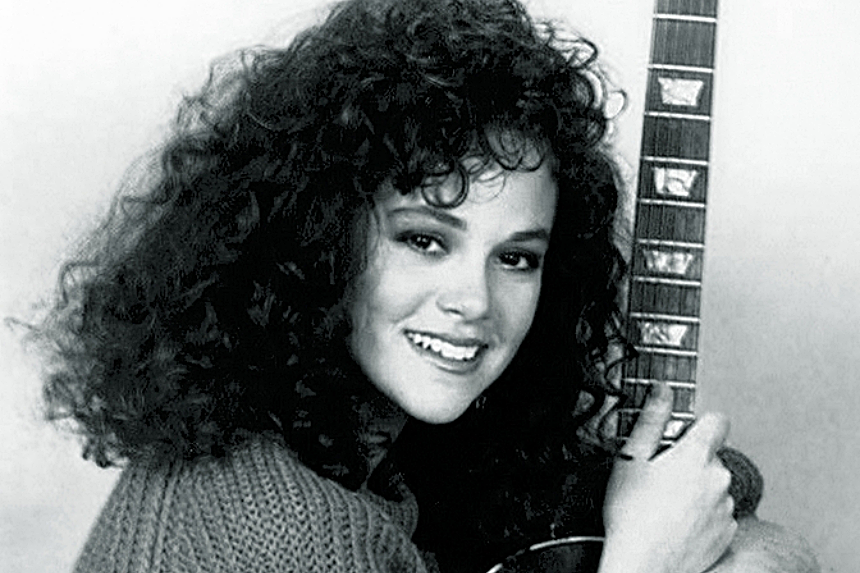Crime in Hollywood isn’t much different than crime in any other town. That’s an aesthetic communicated in the work of writers like Raymond Chandler and James Ellroy that expose the dark underbelly under the bright lights. However, crimes in Hollywood often seem magnified in the media, particularly when they involve the famous. Sometimes, the cases are salacious and the outcomes ruin careers. When the cases involve stalking or violence, even murder, they sometimes generate enough attention to instigate positive change, despite the horror of the crime itself. Our increased awareness of stalking today forces institutions to make real change, like the decision by Google this week to pull several potentially dangerous “people-tracking Android apps” from its Play Store. 30 years ago, the 1989 slaying of Rebecca Schaeffer drew attention to the issue of stalking; as in the near-fatal stabbing of Theresa Saldana in 1982, the perpetrator was an obsessed fan who used public records to track his target. The fallout of the case and trial would strengthen privacy laws and put a spotlight on the danger associated with stalking.
Schaeffer was born in Oregon and began modelling in her teens. By 1984, she had moved to New York City where she attended Professional Children’s School while she worked. Near the end of that year, she began a six-month run on One Life to Live. She spent some time pursuing work in Japan before coming back to the States; an appearance on the cover of Seventeen led to her casting in My Sister Sam, a CBS sitcom vehicle for former Mork & Mindy star Pam Dawber. Schaeffer played Patti, the younger sister of Dawber’s Sam. A hit out of the gate, My Sister Sam had a strong first season but was cancelled in the second when ratings dropped. Coming out of the show, Schaeffer booked work in a few television and theatrical films.
Arizona native Robert John Bardo had a troubled history. A victim of abuse from a family with a history of mental illness, Bardo himself was diagnosed with bipolar disorder. He previously stalked child activist and television performer Samantha Smith; Smith gained fame in 1982 when, at age 10, she wrote a letter to Yuri Andropov on the question of peace, and the leader invited her to visit the Soviet Union. Her popularity led to her casting in the short-live Robert Wagner series Lime Street; unfortunately, Smith and her father died in a plane crash in 1985. Bardo’s obsessions shifted, and eventually settled on Schaeffer through her role on My Sister Sam.
Theresa Saldana played herself in the 1984 film about her attack, Victim for Victims: The Theresa Saldana Story.
Bardo wrote letters to Schaeffer and even attempted to enter the set of the show. He turned to a detective agency, and they acquired the actress’s home address for Bardo from the California Department of Motor Vehicles. Bardo copied the tactic used by Arthur Richard Jackson; in 1982, Jackson hired a private investigator to get information on actress Theresa Saldana, then best-known for her role in Raging Bull. Jackson acquired the phone number of Saldana’s mother and called her claiming to be Bull director Martin Scorsese’s assistant; he said he needed her daughter’s address so that he could reach her about a film opportunity in Europe. Jackson used the address to ambush Saldana, stabbing her ten times. Remarkably, Saldana lived, though she spent four months in the hospital. After the ordeal, she founded Victims for Victims, an organization that would support victims and lobby for stronger laws.
In 1989, Bardo watched the film Scenes from the Class Struggle in Beverly Hills. Schaeffer’s love scene in that film sent Bardo into a rage. Having obtained the address from the detective agency, Bardo went to Los Angeles. Upon his first visit to Schaeffer’s home, she opened the door and spoke to him; he showed her a previous letter and autograph he’d received from her, and she ended the conversation by asking him not to return. He returned an hour later. When Schaeffer opened the door, he shot her in the chest. A neighbor called emergency services, but Schaeffer died shortly after she arrives at Cedars-Sinai Hospital. Apprehended in Tucson after behaving erratically in public, Bardo confessed. He was sentenced to life in prison without parole.
Earlier this year, ABC’s 20/20 revisited the Rebecca Schaeffer case. (Uploaded to YouTube by ABC News)
The case caught nationwide attention. In the aftermath, the story of how Bardo got the address and its roots in the Saldana case outraged many. Victims for Victims and other organizations joined in a wide-ranging effort to get the laws amended in California. By 1990, California passed the first stalking law; today, all 50 states have a version of the law on the books. The Driver’s Privacy Protection Act of 1994 prohibits the DMV from giving out the addresses of private citizens; the creation and passage of the Act is directly attributed to Saldana and Schaeffer’s stories, as well as harassment directed against abortion providers and patients. The LAPD also has a special unit, the Threat Management Unit, that deals with reports of obsessed fans and stalking; victims in felony stalking cases can now also obtain restraining orders that last up to 10 years.
Stalking hasn’t gone away, particularly in the case of celebrities. Sandra Bullock, Harry Styles, Selena Gomez, and others have dealt with the issue in recent years. Fortunately, there is now greater awareness of the seriousness inherent in the topic and a much greater set of tools for law enforcement to use. Earlier this week, Google’s action against apps that people were using to spy on their “romantic partners,” while tracking their movements, is a positive step, but a reminder that society should remain vigilant. Rebecca Schaeffer’s promising life and career may have been cut short, but there’s a tiny ray of positivity in the notion that many more people have been protected, and possibly saved, as a result of her passing.
Featured Image: Rebecca Schaeffer (Wikimedia Commons)
Become a Saturday Evening Post member and enjoy unlimited access. Subscribe now



Comments
This story is still very chilling and extremely tragic 30 years later. The only ‘good’ to come out of it were the passages of the stalking laws at least reducing the risk of something like this happening again to celebrities and everyone else.
Thanks for the links on Rebecca Shaeffer and Theresa Saldana. Films have a responsibility not to glamorize or be ‘how to’ guides’ for sick and crazy people that are on the edge and might not have committed the crime otherwise. The ‘industry’ will say if someone’s going to do that, they’re going to no matter what, letting themselves off the hook for any kind of responsibility. No wonder it’s an industry that few (including many people in it!!) have so little respect for.